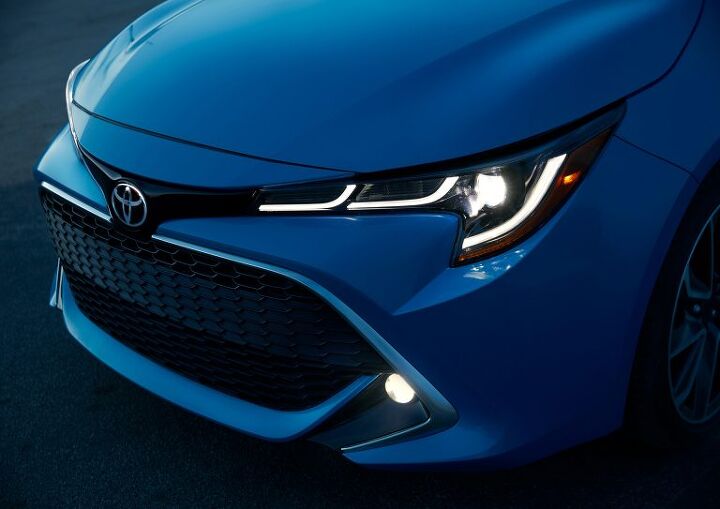Fuel Pump Issue Forces Toyota to Recall Almost 700,000 Vehicles

Toyota has announced the recall of 696,000 vehicles in the United States due to safety concerns caused by a suspect fuel pump. The manufacturer said affected vehicles are equipped with a pump which may stop operating, asking customers to be on the lookout for warning lights and a rough running engine.
Impacted autos run the risk of stalling, with an inability to restart the vehicle if the fuel pump fails entirely.
While this doesn’t guarantee a crash, Toyota worries a sudden loss of power at highway speeds will lead to dangerous mishaps. The automaker said it is currently conducting investigations to find a solution for the problem and intends on notifying Toyota and Lexus owners by mail in March.
Affected models include the 2018-2019 model year Lexus LS 500, LC 500, RC 350, RC 300, GS 350, IS 300, ES 350, LX 570, GX 460, and RX 350; certain 2019 model year Lexus NX 300, RX 350L, and GS 300 vehicles; certain 2018-2019 model year Toyota 4Runner, Camry, Highlander, Land Cruiser, Sequoia, Sienna, Tacoma, and Tundra vehicles; and certain 2019 model year Toyota Avalons and Corollas.
That’s quite the variety of vehicles. If you’re concerned this recall pertains to you, a quick visit to Toyota.com/recall or nhtsa.gov/recalls may be in order. You’ll just need to have your Vehicle Identification Number handy so you can run a quick search to see whether or not you’ve managed to dodge the bullet. Otherwise, you should receive a letter in the mail in a couple of months.
Obviously, all repairs covered by the recall will be conducted free of charge.
[Image: Toyota]

A staunch consumer advocate tracking industry trends and regulation. Before joining TTAC, Matt spent a decade working for marketing and research firms based in NYC. Clients included several of the world’s largest automakers, global tire brands, and aftermarket part suppliers. Dissatisfied with the corporate world and resentful of having to wear suits everyday, he pivoted to writing about cars. Since then, that man has become an ardent supporter of the right-to-repair movement, been interviewed on the auto industry by national radio broadcasts, driven more rental cars than anyone ever should, participated in amateur rallying events, and received the requisite minimum training as sanctioned by the SCCA. Handy with a wrench, Matt grew up surrounded by Detroit auto workers and managed to get a pizza delivery job before he was legally eligible. He later found himself driving box trucks through Manhattan, guaranteeing future sympathy for actual truckers. He continues to conduct research pertaining to the automotive sector as an independent contractor and has since moved back to his native Michigan, closer to where the cars are born. A contrarian, Matt claims to prefer understeer — stating that front and all-wheel drive vehicles cater best to his driving style.
More by Matt Posky


































Comments
Join the conversation
Yeah right, but Ford sucks anyway.
I have never owned a Toyota and might not ever own one but then again I might own one in the future. I am not a fan of small turbo 4s and CVTs and Toyota seems to be the last to adopt both but that could change especially with auto makers looking for ways to increase mpgs to comply with future mandates. I have always liked Hondas but I am not a fan of their new turbo engines and CVTs--Earth Dreams are becoming Earth Nightmares for many Honda owners. I had my 99 S-10 for 20 1/2 years which I gave to my nephew and it is still running strong but I don't believe I would buy a new GM product with all the problems recent GMs are having but then I would not buy a new Ford or FCA product either. It just might come down to in the future buying a Toyota. I did buy my neighbors low mileage 2012 Buick Lacrosse which for now seems to be flawless but then the Impala and the Lacrosse seem to be among the last good vehicles GM has made and both are dead brands. In the future my choice might be between Toyota, Hyundai, or Kia.
Agree Toyota is going in the same direction although not as fast. Slow adoption of turbos and CVTs has been a positive for Toyota since it has not yielded them the problems that the other manufacturers have had.
Considering all objective data available, Toyota vehicles continue to take top quality spots, both initially and over time, with Lexus being #1 for quite a long time. Some Toyota models have had issues here and there, but everyone stating that Toyota quality is worse than the big 3 are dead wrong. I do not own a Toyota FWIW. An acquaintance shared this with me, and I am inclined to agree based on experience: Toyota finds out that a handful of fuel pumps supplied by a vendor are out of spec. Toyota issues a recall and replaces a wide swath of them proactively, even though only a few vehicles were actually affected. Chevy would tell you that the pump is "operating in GM specs" and then replace it after the warranty is up - on your dime. Ford would issue a recall, but there would be several other recalls ahead of the fuel pump, and the dealer wouldn't have the parts for months anyway. RAM would take the truck off the flatbed, and the mechanic would smack the fuel pump with a hammer. The pump would come back to life (albeit temporarily), mechanic would log NTF, and send you on your way.